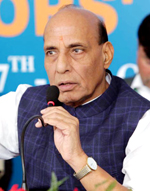CHANDIGARH, Oct 17:
Mounting a scathing attack on Pakistan, Home Minister Rajnath Singh today said its entire establishment is engaged in fuelling terrorism in India making management of the Indo-Pak border “challenging” and warned that “those who breed snakes get bitten by them”.
He slammed Islamabad for adopting a “very flexible” approach to deal with terrorism and said if it wanted, India can help it carry out an anti-terror campaign in PoK.
Singh asserted that India is against Pakistan-sponsored terrorism and does not breed any hatred towards Pakistani people.
Addressing a two-day Regional Editors Conference from north and northeast States here, he said, “Pakistan is so much obsessed with Kashmir that it cannot see the difference between a freedom fighter and a terrorist. When there is a talk about state and non-state actors, the argument put forward is that Pakistan is a non-state actor.
“The truth remains that the entire establishment in Pakistan is engaged in fuelling terrorism in India. And that is why managing our borders with Pakistan, as compared to other countries, has become a challenging task.”
Pakistan has adopted terrorism as its state policy and is getting isolated in the entire international community, the minister said.
“Pakistan is so obsessed with some issues that it cannot do any good, nor can it see its own good. By adopting terrorism as state policy, it is isolating itself not only in south Asia, but in the entire international community.
“In BRICS’ Goa declaration, terror was strongly condemned. It was stated that no State should allow its territory to be used for terror activities,” he said.
He also denounced Pakistan for adopting a “very flexible” approach to deal with terrorism.
“As far as our relations with Pakistan are concerned, the biggest hurdle is that Pakistan’s approach towards terror remains very flexible. Those who breed snakes get bitten by them. Pakistan should understand this. India wants that terrorism should be wiped out from the entire region,” Singh said.
The Minister said, “We want to say that we do not breed any hatred towards Pakistani people, but if we have hatred, it is towards Pakistan-sponsored terrorism.
“If Pakistan’s intention to act against terrorism remains clear, India will help it conduct an anti-terror campaign in PoK. It can also take help from anyone in the global community, but its intention is not clear. If terror factories operating across the border are closed down, it can usher peace in the region and open doors for development.”
Singh said that four months ago a committee was formed to give suggestions on sealing the border with Pakistan.
“The Madhukar Gupta Committee has submitted its report. We have also prepared an action plan. We will completely secure the Indo-Pakistan border by 2018,” he said.
Physical barriers have been put up along 2,034.96 km of the 2,289.66 km-long Indo-Pak border, he told the gathering.
“The rest of the boundary is 254.80 km long. It includes riverine areas and tough terrain. We have decided to create physical barriers wherever possible. Where physical barriers like erecting fencing is not possible, non-physical barriers should be created,” he said.
“For non-physical barriers, there are solutions like sensors, radars and laser wall. These all will be used,” he said, adding a pilot project in this direction is being implemented by BSF in Jammu, Punjab and Gujarat.
“The use of non-physical barriers on experimental basis will help ascertain up to what extent it is helpful and what sort of loopholes are there which need to be addressed. A report in this regard is expected to come by the end of the year,” he said
Talking about the surgical strikes by the Army across the LoC, Singh said it was a counter-terror operation.
“Our forces did not cross the LoC to carry out an attack on Pakistan, but they carried out pre-emptive anti-terror surgical action to destroy the terror launch pads there,” he said.
The Minister said India’s ties with China are “good to a large extent” and that there was a drop in the cases of transgression in the past two years.
“We consider our borders with China and Pakistan as strategic and sensitive. As far as our border with China goes, ITBP is entrusted with guarding it. We keep talking on perceptional differences (related to border).
“Overall, I can say our relations with China are good to a large extent. Its result is that after 2014, there has been a drop in cases of transgression. Till September, 170 such incidents took place. The number was 270 in the corresponding period last year and 432 in 2014,” he said.
“Earlier, transgression cases were high, but there has been a decline in the past two years. We have tried to resolve our border issues with China from time to time. We have focused on development and trade,” Singh said. (PTI)
Trending Now
E-Paper


